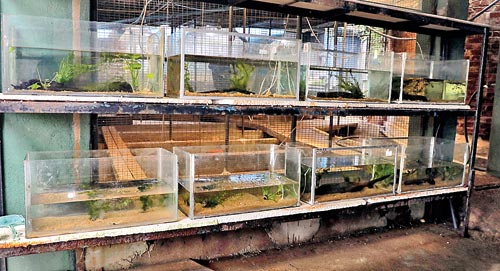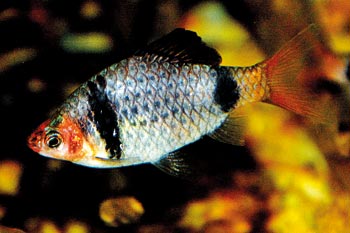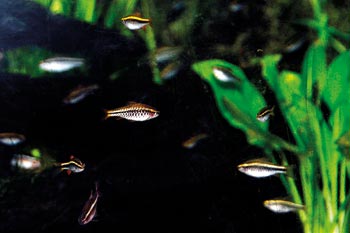News
Zoo resorts to captive breeding to multiply and protect endangered fish

The zoo's aquarium section has started to breed around 10 endemic fish species. Pix by Priyanka Samaraweera
The Dehiwala Zoo is resorting to captive breeding of endangered and critically endangered endemic fish species in Sri Lanka in an attempt to create captive insurance populations, which in simple terms mean populations created to ensure the survival of a species in case of a catastrophic event, such as a natural disaster or disease outbreak.
The Zoo’s Operations Director, Anoma Priyadharshani, said their ultimate objective was to utilise endemic fish in an ex-situ conservation initiative. This would involve bringing endangered species from their natural habitat into captivity to prevent the extinction of these fish species in the wild.
She explained that the National Zoological
Gardens Department
would work
closely with
the Wildlife Conservation Department
(DWC) to select release areas and identify and
preserve
unique habitats.

Bandula barb
Ms. Priyadaharsani said their efforts offered hope for the preservation of endemic, endangered and threatened fish species.
The director also said the zoo carried out breeding for critically endangered fish species.
She said the zoo’s aquarium section has started to breed around 10 endemic fish species, including two-point endemic fish species such as, Bandula barb (Pethia bandula ) and Asoka barb (Systomus asoka ).
Some of the fish species that are being bred at the zoo are Ceylonese comb tail (Belonita singnata), black ruby barb (Pethia nigrofasciata), Barred Daniyo (Devario pathirana), and Cherry barb (Puntius titteya).

Cherry barb
The zoo’s aquarium recreated the habitat requirements of the fish by monitoring the quality, temperature, pH level, alkalinity, and salinity of the water when breeding fish, she said.
The director added that they also simulated lighting and even maintained the speed of water flow and temperature suited for each species of endemic fish to encourage breeding. She added that, apart from that, they also used hormones to enable breeding.
Ms. Priyadaharsani said the knowledge they had acquired by creating habitats to breed fish would be used in the conservation of the wild habitats of endemic fish.
“We are planning to obtain approval from DWC to release some of the captive-bred endemic fish to wild habitats and allow us to protect those habitats,” Ms. Priyadharshani said, adding that they hoped to draw up a national protocol on the release of endemic fish. An expert committee will be set up shortly to draft guidelines.

Anoma Priyadharshani
Meanwhile, the curator of the zoo’s aquarium and reptarium, Nalinda Jayalath, said that they maintained proper genetic lines for the fish they bred. To avoid inbreeding and maintain genetic diversity, they collected fish from the wild.
He said specimens from the wild were collected after obtaining DWC permits and adhering to strict conditions. He added that they only collected a minimal amount of fish from locations such as Kithulgala, Neluwa Bulathsinhala, and Karuwalagaswewa.
“The point-endemic and critically endangered fish’s habitats need to be preserved if wild populations need to exist,” he added.
National Zoological Gardens Director General Ranajan Marasinghe said they were also planning to carry out an awareness programmeme simultaneously with the breeding programmeme for the endemic fish. The programme would target schoolchildren and stress the ecological importance of endemic fish.
“We plan to get the schoolchildren also involved by teaching them breeding techniques; we plan to make this a sustainable community project where the people will preserve the environment and also continue breeding projects,” he said.
| Move to regulate export trade | |
| Social media and aquarium websites carry advertisements to sell Sri Lanka’s endemic fish to foreign countries, such as the UK. The varieties included black, ruby, and cherry barbs. Colourful fish are much in demand, and they are sought after by collectors and aquarium hobbyists. Zoo Director Anoma Priyadharshani said that exporting fish caught in the wild should be discouraged. Therefore thay are hoping to get the prevailing restrictions and regulations on breeding and exporting fish in captivity relaxed so that the National Zoological Gardens would be permitted to breed and export endemic fish, thus catering to the demands of the local and foreign aquarium industries. She explained that this would bring additional income to the country and improve the local aquarium industry.
|
| Finding partners | |
| The Dehiwala Zoo is planning to find partners for single animals at the zoo, Director Anoma Priyadharsani told the Sunday Times. She explained that the brown bear, giraffe, and some other foreign animals do not have mates. Therefore, the zoo is organising several animal exchange programmes with foreign countries to find them partners. |
The best way to say that you found the home of your dreams is by finding it on Hitad.lk. We have listings for apartments for sale or rent in Sri Lanka, no matter what locale you're looking for! Whether you live in Colombo, Galle, Kandy, Matara, Jaffna and more - we've got them all!

